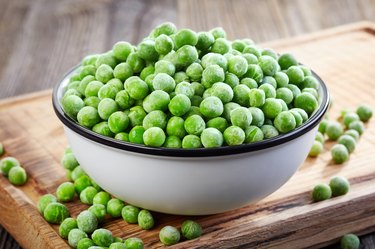
Each day, the average adult's kidneys filter metabolic waste out of 120 to 150 quarts of blood. Uric acid is one of the by-products removed and eliminated from the body. If your blood concentration of uric acid is too high, your kidneys may not be able to keep up, leading to the development of some medical conditions. Certain foods like peas can affect your uric acid level. Talk to your doctor about including peas in your diet if you're concerned about uric acid.
Understanding the Effect of Purines
Video of the Day
Uric acid is released in your blood when your body breaks down purines. These are compounds that occur naturally at varying levels in both plant- and animal-based foods. A diet containing many moderate- or high-purine foods may elevate your uric acid level enough for uric acid crystals to accumulate in your kidneys or joints and cause stones or gout, a type of inflammatory arthritis. If you already have these medical problems, eating purine-rich foods can exacerbate your symptoms.
Video of the Day
Gauging the Purines in Peas
Most fresh vegetables are low in purines, with up to 50 milligrams of purines in every 100 grams. Green peas, however, fall into the moderate-purine category, which includes foods containing 50 to 150 milligrams of purines in every 100 grams. Other moderate-purine vegetables include asparagus, mushrooms, cauliflower and spinach. Dried peas, such as green or yellow split peas, are also in this category, with a purine content similar to that of meat, poultry and most types of seafood.
Determining Your Recommended Intake
People on a low-purine diet should consume no more than a 1/2-cup serving of cooked or raw moderate-purine vegetables each day. If you eat cooked peas at lunch, avoid vegetables like asparagus or spinach at dinner. In addition, limit your consumption of moderate-purine protein foods, including dried peas, to one or two daily servings. A single serving is equivalent to 1 cup of cooked dried peas, beans or lentils and approximately 2 to 3 ounces of meat, poultry or seafood.
Incorporating Expert Advice
Every person with gout or kidney stones may react differently to fresh or dried peas. If you experience a flare-up of your symptoms after eating peas, avoid them until the problems decrease. Eliminate them -- and all other moderate- and high-purine foods -- if you are struggling to manage your condition, advises the Myrtue Medical Center. Drinking plenty of fluid daily, limiting your fat intake and trying to get at least 50 percent of your daily calories from carbohydrates will also help lower uric acid levels.